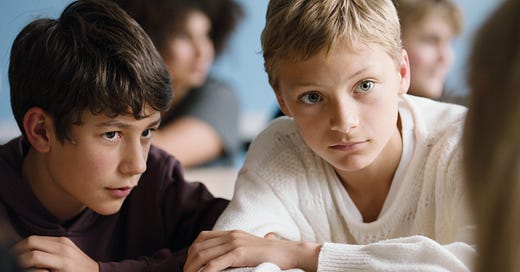There’s a lot of pain in Close.
Belgian director Lukas Dhont shows us the world through the eyes of Léo (Eden Dambrine) and Rémi (Gustav De Waele): two boys, best friends, who live next-door to one another and go to school together. We get the impression they’ve known each other their whole lives, as they freely flow from one boy’s house to the other, each of their families feeling more like an extension of one whole than separate nuclei.
They play “soldiers” in Léo’s family’s farm fields and sleep nestled together at each other’s houses on school nights. At school, they’re inseparable, hanging on each other and laughing all day.
Unfortunately, as it tends to do, adolescence comes knocking, hard. It brings with it the jeering of classmates at Léo and Rémi’s close relationship. “Are you… together?” a girl pries, feigning innocent curiosity but suggesting something wrong with that prospect. At this age, such an accusation rattles Léo. Of course not, he purports. But he needs proof. So he begins to push Rémi away.
In their fallout, Rémi’s and Léo’s lives change fundamentally, as does the unified dynamic of their families. The golden montages of boys racing gleefully across fields give way to rainy sequences of stilted awkwardness and that childlike sense of helplessness when the world around you changes. Pain.
Admittedly, it’s a beautifully-rendered portrait of childhood friendship and responsibility. That said, it’s more of an impressionist picture than an especially intricate one. We don’t learn a ton about who the boys are as individuals or what’s going through their (or their parents’) minds during all of it.
It’s a lot of long shots of detached thousand-yard stares. Certain character choices are, sure, understandable with an open mind, but it would have been nice to get a stronger sense of why.
One might describe this approach as admirably open-format—Dhont is giving us the opportunity to paint our own imaginations onto them and draw our own conclusions. But it’s a lot of Choose-Your-Own-Depressive-Thought for 100-plus minutes; perhaps this rendition of this story would be better suited to 30 or 45.
I can appreciate the young talent laid before us. Dambrine and De Waele do a marvelous job, as does Émilie Dequenne, who does most of the heavy-lifting on the adult side as Rémi’s mother searching for closure.
Beyond the strong, naturalistic performances and Frank van den Eeden’s pretty, intimate camera work, however, Close left me somewhat out in the cold. Dhont’s preference for atmosphere and emotional quietude causes time slow down, creating a real drag once the boys fall out. That would be well-worth it for a more specific character study and eventual catharsis, but Dhont would rather convey the malaise of young sadness.
And that’s fair. I believe I’m on the low end of the reception Close has been getting; it seemed to work better for everyone else at my screening than it did for me. Many eyes were being wiped as the lights came up. So it may be that Close’s slow stillness and is what gives it power for others. Personally, I needed more than melancholic vagary—either less time spent in it, or more detail applied.






Makes sense, sounds like a fair review.